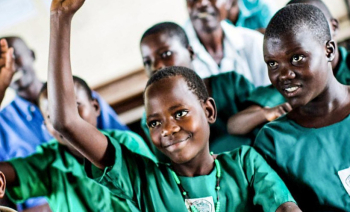@media (max-width: 1333px) { .mobile-img { margin-left:0px !important; } .mobile-video { margin-right: 0px !important; } .mobile-quote, .mobile-table { display:none; } } .drop-cap { font-size: 4.5em; float: left; line-height: 55px; padding-right: 8px; padding-left: 0; } .panel-body { padding-left:15px;padding-top:15px;} .panel-heading {display:block; border-top:1px dotted #dddddd;;border-bottom: 1px dotted #dddddd; padding: 5px;} .panel-title a {color:#4a4a4a;} .text-highlight {background-position-y: -0%;background-image: linear-gradient( white 50%, gold 50%);transition: background 500ms ease;background-size: 2px;background-size: auto 175%;} .text-highlight:hover {background-position-y: 100%;}
What kind of issues and challenges do teachers face in developing countries? What forms of support can help address them? Join our discussion and share your views.
In many primary classrooms in Uganda, there are more than 50 students for every teacher; some rural areas count as many as 100.
Sometimes schools also simply lack adequate classrooms – especially during times of emergency.
“Teachers may have to stand under a tree to conduct their lessons,” said Juliet Wajega, Deputy General Secretary of the Uganda’s National Teacher’s Union (UNATU), an affiliate of Education International, the global teacher union's federation.
Requests for better teacher support
|
In September 2018, in response to the high student-to-teacher ratio, the Uganda's National Teacher's Union requested that the national government finance the recruitement of 22,000 additional primary school teachers. In their request, UNATU stressed a fair wage and decent working conditions as prerequisites for a better standard of education. |
“There’s a lot of expectation put on teachers, and yet what is given to them doesn’t [allow them to] meet that kind of demand,” added Wajega.
For example, low wages and unreliable pay-out mechanisms have meant that teachers may go for periods of up to six months without pay, according to Education International.
Besides a growing sense of demotivation, this has caused several practical problems, with some teachers unable to afford transport fees to travel to their assigned school or to acquire basic items for everyday life.
In turn, those difficult financial conditions hinder the attractiveness of the teaching profession, said Wajega.
For her, targeting financing more towards the needs of teachers can overcome some of these problems – while providing a sense of ownership to the teachers. “Because teaching is not like a production in the store,” she said. “Somebody’s heart must go into the teaching.”
Identifying the problems and solutions
Addressing the challenges faced by teachers – both professional and personal ones – is critical, because as many as 85% of all primary educators in Uganda have reportedly considered quitting the profession.
Juliet Wajega on the challenges to education in Africa and how international partners can better engage with teachers:
According to Wajega, the real problem is that the money invested in education – instead of going to teachers' training and development – is frequently allocated to other activities, like curriculum development. This rarely translates into the type of material benefits that are needed to keep schools up and running, Wajega added.
But improving outcomes isn’t about teachers alone.
Effectiveness begins with conducting proper needs-based assessments and involving teachers, unions, and the beneficiaries in this process, explained Wajega. This includes basing educational interventions on concrete data and on the lived experience of stakeholders.
“We should note that governments in Africa have been subjected to loans, with a lot of conditionalities… and in the end, we have not seen the desired results,” said Wajega. “Moving forward, we need to have national governments take charge through proper diagnostic studies and bring in international support based on these.”
?
What kind of challenges do teachers face in your partner country? What forms of support can help address them?
Register or login to post your comments below.
Photo © Jay Hsu/Flickr
The article was written by Craig Hill.




Log in with your EU Login account to post or comment on the platform.